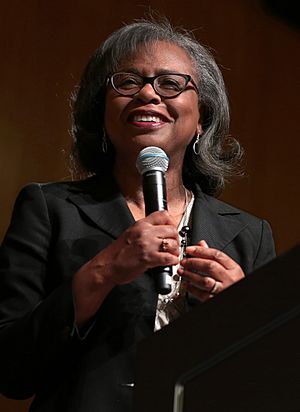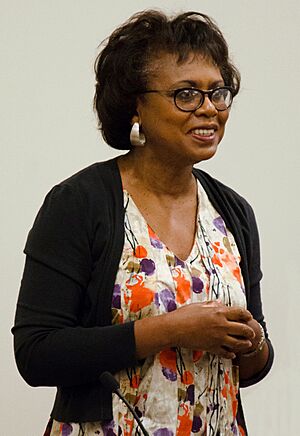Anita Hill facts for kids
Quick facts for kids
Anita Hill
|
|
|---|---|

Hill in 2018
|
|
| Born |
Anita Faye Hill
July 30, 1956 Lone Tree, Oklahoma, U.S.
|
| Education | Oklahoma State University (BS) Yale University (JD) |
| Employer | Brandeis University |
Anita Faye Hill (born July 30, 1956) is an American lawyer, teacher, and writer. She is a professor at Brandeis University. She teaches about social policy, law, and women's studies. She became well-known in 1991. This happened when she spoke out about her former boss, Clarence Thomas. He was nominated to be a judge on the U.S. Supreme Court.
Contents
Early Life and Education
Anita Hill was born into a farming family in Lone Tree, Oklahoma. She was the youngest of Albert and Erma Hill's 13 children. Her family came from Arkansas. Her maternal grandfather and great-grandparents had been born into slavery. Hill grew up in the Baptist faith.
She graduated from Morris High School in Oklahoma in 1973. She was the best student in her class. After high school, she went to Oklahoma State University. She earned a degree in psychology with honors in 1977. She then studied at Yale Law School. She received her law degree with honors in 1980.
Early Career and Teaching
After law school, Anita Hill worked as a lawyer in Washington, D.C.. In 1981, she became an attorney for Clarence Thomas. He was then working for the U.S. Department of Education. When Thomas became the head of the Equal Employment Opportunity Commission (EEOC) in 1982, Hill worked as his assistant. She left that job in 1983.
Hill then became a professor at the O. W. Coburn School of Law. She taught there from 1983 to 1986. In 1986, she joined the faculty at the University of Oklahoma College of Law. There, she taught about business law and contracts.
In 1989, she became the first African American professor at the University of Oklahoma to get a permanent teaching position. She left the university in 1996. This was because people kept asking her to resign after her 1991 testimony. In 1998, she became a visiting scholar at Brandeis University. In 2015, she became a university professor there.
Continued Work and Advocacy
Anita Hill continued to teach at the University of Oklahoma. She also spent two years as a visiting professor in California. She officially left her job in October 1996. In her last semester, she taught a law class on civil rights. A special teaching position was created in her name. However, it was later canceled and never filled.
In 1997, Hill joined the faculty at Brandeis University. She first worked in the Women's Studies Program. Later, she moved to the Heller School for Social Policy and Management. In 2011, she also took a job as a lawyer. She worked with a law firm that helps people with civil rights and employment issues.
Over the years, Hill has shared her thoughts on gender and race. She has appeared on national TV shows like 60 Minutes and Meet the Press. She has also given many speeches. These speeches are about business law, race, and women's rights. She has written articles for The New York Times and Newsweek. She has also written for many legal and academic publications. Her topics include international business law, bankruptcy, and civil rights.
In 1995, Hill helped edit a book called Race, Gender and Power in America: The Legacy of the Hill-Thomas Hearings. In 1997, Hill published her own book, Speaking Truth to Power. In this book, she wrote about her experience with the Clarence Thomas situation. She also wrote that helping to create a better society was important to her. ..... This book was called Sisterhood Is Forever: The Women's Anthology for a New Millennium.
In 2011, Hill published her second book. It was called Reimagining Equality: Stories of Gender, Race, and Finding Home. This book talks about the housing crisis that caused many African-American families to lose their homes. She believes we need a new understanding of how important a home is. She also talks about its place in the American Dream. On March 26, 2015, Brandeis University gave Hill a promotion. She became a Private University Professor of Social Policy, Law, and Women's Studies.
On December 16, 2017, a new group was formed. ..... Hill was chosen to lead this group. ..... The group found that unfair treatment was still common. It also found that different groups of people saw discrimination and harassment differently.
In September 2018, Hill wrote an article for The New York Times. It was about the accusations made by Christine Blasey Ford. These were made during the nomination of Brett Kavanaugh to the Supreme Court. On November 8, 2018, Anita Hill spoke at an event at USC Dornsife. .....
Her Writings
In 1994, Hill wrote about Thurgood Marshall. He was the first African American Supreme Court Justice. He was a judge before Clarence Thomas. Hill's writing was called "A Tribute to Thurgood Marshall: A Man Who Broke with Tradition on Issues of Race and Gender". She wrote about how Marshall helped bring about equality. She explained how his work affected African Americans, especially women.
On October 20, 1998, Hill published her book Speaking Truth to Power. In this book, she shares details about her side of the workplace behavior situation. She also writes about her professional relationship with Clarence Thomas. The book also gives a look into her personal life. It covers her childhood in Oklahoma and her time as a law professor.
Hill became a strong supporter of women's rights. This can be seen in a chapter she wrote for a 2007 book. The book was called Women and leadership: the state of play and strategies for change. She wrote about women judges. She believes they are very important for a fair justice system. She argues that women and men have different life experiences. Because of this, both are needed for a balanced court. She writes that for the best law system in the United States, all people need to be represented.
In 2011, Hill's second book was published. It was called Reimagining Equality: Stories of Gender, Race, and Finding Home. She talks about the connection between home and the American Dream. She also shows the unfairness in gender, race, and home ownership. She believes that a democracy where everyone is included is more important than arguments about legal rights. She uses her own story and the stories of other African American women, like Nannie Helen Burroughs, to support her ideas.
On September 28, 2021, Hill published her book Believing: Our Thirty-Year Journey to End Gender Violence.
Awards and Recognition
In 1992, Hill received an award from the American Bar Association. It was called the "Women of Achievement" award. In 2005, Hill was chosen as a Fletcher Foundation Fellow. In 2008, she received the Louis P. and Evelyn Smith First Amendment Award. She also serves on the board of trustees for Southern Vermont College. In 1993, she was added to the Oklahoma Women's Hall of Fame. On January 7, 2017, Hill became an honorary member of the Zeta Phi Beta sorority. A phone booth at The Wing in Washington, D.C., is dedicated to her.
A small planet, 6486 Anitahill, is named in her honor. It was discovered by Eleanor Helin. The official naming was announced on November 8, 2019.
Honorary Doctorates
- 2001: Simmons University
- 2001: Dillard University
- 2003: Smith College
- 2007: Lasell University
- 2008: Massachusetts College of Liberal Arts
- 2013: Mount Ida College
- 2017: Emerson College
- 2018: Wesleyan University
- 2019: Lesley University
- 2022: Mount Holyoke College
See also
 In Spanish: Anita Hill para niños
In Spanish: Anita Hill para niños
- Clarence Thomas Supreme Court nomination
- Brett Kavanaugh Supreme Court nomination
- Christine Blasey Ford


